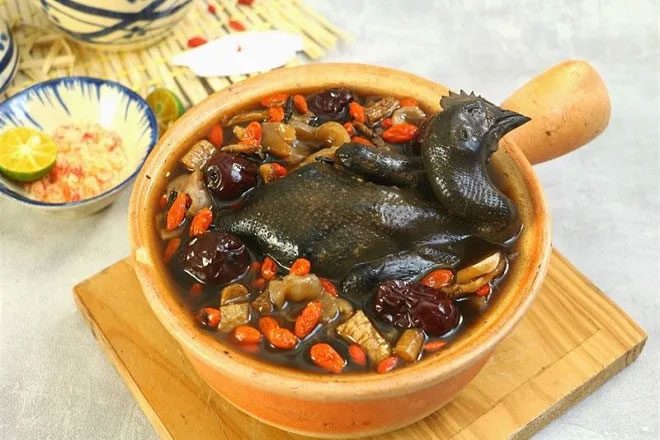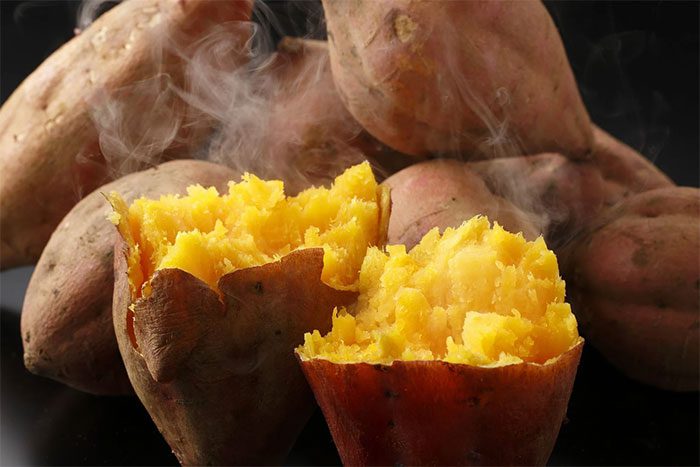In winter, nutrient-rich foods with antioxidant properties that boost the immune system will help keep you warm throughout the cold season.
Currently, the cold air is intensifying, causing temperatures in the northern provinces to drop significantly, which has a considerable impact on the health and lives of people. According to Dr. Duong Ngoc Van, who works at a hospital in Hanoi, during winter, nutrient-dense foods rich in antioxidants that enhance the immune system will keep you warm throughout the chilly season.
1. Chicken

Black chicken stewed with medicinal herbs and lotus seeds is “great nourishment” for health. (Illustrative image).
People often say: “In the cold season, drink chicken soup for a strong body in the new year.” Chicken is a lean meat that is high in protein. Eating chicken is warming, nutritious, easily digestible, and readily absorbed, thus it won’t overly burden the digestive system. In winter, when the weather is chilly, having a pot of chicken soup will warm your stomach and body.
Moreover, chicken can be prepared in various dishes such as lotus root corn chicken soup, chicken stewed with mugwort, chicken porridge, or chicken stewed with various seeds and pumpkin… Additionally, a dish that is appealing, easy to make, and can be eaten quite frequently is sticky rice with chicken. Both have warming properties.
Chicken provides a wealth of nutrients, helping to nourish the body and increase resistance against illnesses caused by the weather. Sticky rice also helps strengthen the lungs, supports the spleen, and improves symptoms of cold-related issues such as loose stools, difficulty urinating, and night sweats… However, those with many sores or unhealed wounds are advised by traditional healers to avoid eating sticky rice.
Additionally, in winter, you should consume red meats such as beef, lamb, and pork tenderloin to supplement the necessary iron levels in your body. When the body has adequate iron levels in the blood, symptoms like numbness and coldness in the hands and feet will also improve significantly.
2. Sweet Potatoes
Sweet potatoes are highly nutritious and a great nourishing food during winter.

Avoid choosing immature sweet potatoes as they lack stickiness and have lower starch content, and do not choose overly mature sweet potatoes as they will be tough and hard. (Illustrative image)
With a high fiber content, low fat, and abundant vitamins, consuming sweet potatoes in winter helps improve the immune system, fighting against harmful external agents.
Additionally, sweet potatoes are very effective in treating constipation. If you often suffer from constipation, eat more sweet potatoes. However, you should avoid consuming them at night as they may cause indigestion and bloating.
3. Nuts
Nuts are rich in healthy fats and high in micronutrients, making them a perfect choice for winter. These nuts also contain beneficial fatty acids that are good for the body, especially the skin. Therefore, increasing nut consumption in winter not only helps keep the body warm but also prevents dry skin and chapped lips.
Peanuts, almonds, and walnuts are excellent nuts for the body. They contain essential fatty acids, proteins, and vitamin E, which help gradually warm your body and increase cold resistance.
Furthermore, red dates are very rich in vitamins and are known as “nature’s vitamin pill.” Eating more red dates during winter helps enrich the blood and warm the body. Red dates are also rich in fiber and can be used to make porridge or sweet pastries.
4. Ginger and Cinnamon
Ginger contains gingerol and shogaol, which have heat-producing properties that warm the body in cold weather. Therefore, on chilly winter days like these, you should get into the habit of drinking hot ginger tea every day. Additionally, ginger helps treat colds, sore throats, headaches, and nausea.
Scientists have verified the safety of cinnamon, and the results indicate that cinnamon helps reduce harmful compounds in the body, making it very safe for health. Cinnamon is a warming spice, thus it is very suitable for those who often feel cold in the stomach. Adding a bit of cinnamon and ginger to your tea will be very comforting.
5. Iodine-rich Seafood

Some types of seafood that keep warm in winter. (Illustrative image)
Iodine stimulates the secretion of many thyroid hormones. These hormones generate heat, promote the oxidation processes in the body’s cells, increase metabolism, and enhance blood circulation under the skin, which helps combat the cold. Iodine-rich seafood includes shrimp, crab, clams, and mussels.
So this winter, we no longer need to worry about keeping our bodies warm. Additionally, you should also dress warmly!


















































